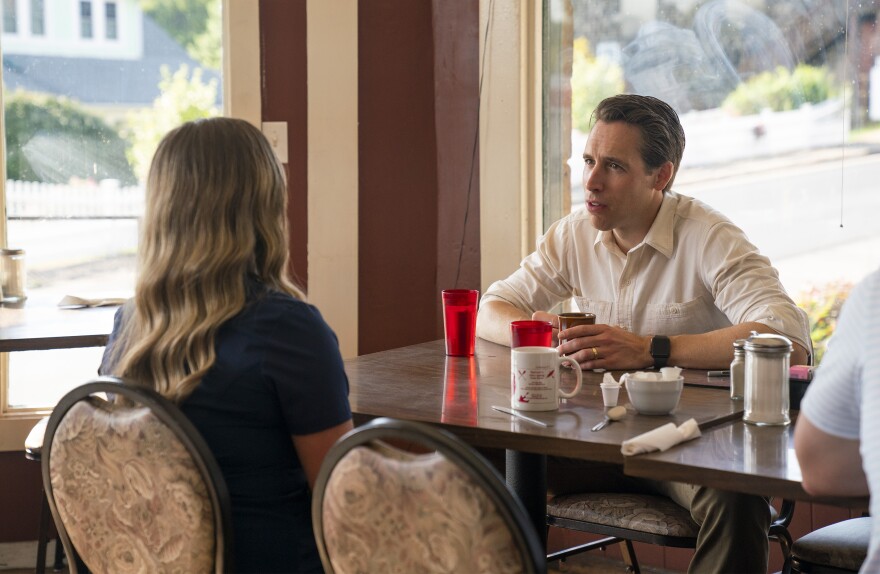U.S. Sen. Josh Hawley had relatively simple goals in his tour last week of some of Missouri’s most economically distressed communities: Listen to Missourians and tell their stories.
The GOP senator traversed 10 rural counties last week, documenting parts of the tour on social media. He said he wasn’t there to pitch ideas to constituents, but rather to “learn from them and to hear about their lives and to hear about what their needs are, their struggles, their ideas, their thoughts.”
“I laughed with them. Sometimes I cried with them,” Hawley said.
Some of the people Hawley spoke with took off from work. Other meetings were spontaneous, such as when he met people at a Malden barbershop. Many of these meetings were documented on Twitter.
When asked why he decided to use Twitter to showcase the tour, especially since he’s been so outspoken against social media companies, Hawley said he wanted to show these individuals without any sort of varnish.
“These weren’t political events. Most of them consider themselves nonpolitical people,” Hawley said. “And we just wanted to share about them in a way that wasn’t filtered.”
Among the themes that emerged from talking with people on his tour were a desire to bring economic development to rural communities and worries about drug abuse.
In nearly every city he visited, Hawley said people were gravely concerned about drug abuse—especially methamphetamine and heroin.
“These places, every one of them, are just overwhelmed by meth in particular—but also heroin and fentanyl. It is just pouring into the state,” Hawley said. “It’s truly an epidemic.”
Hawley said that many younger farmers were concerned about countries like China manipulating their currencies to gain an advantage in trade. He also said some of the people he talked with in the state’s Bootheel region were concerned about the “availability of land.”
“Some of this land is increasingly owned by corporate farms who are only willing to rent it out to independent farmers on very onerous conditions—a lot of times you have to use their seed,” he said. “You have to produce the way they want to produce. It’s really getting to be a situation where how can a young family break into farming? If they can get into it, how do they sustain themselves?”
When asked if farmers want him to ask President Donald Trump to stand down on higher tariffs, Hawley replied, “They didn’t complain to me about the president.”
“They did not ask me to ask the president to stand down at all,” he added.
Rural African American focus
Hawley also met with members of the Bootheel’s African American community. Black residents make up around a quarter of the population in some southeast Missouri counties. Malden, in Dunklin County, is about 33% African American, according to the U.S. Census.
He said most people he talked to stressed a need to expand educational opportunities.
“Most didn’t have a formal education beyond high school,” Hawley said. “If they could get some vocational or skills training, that would make a huge difference. It would make a huge difference to everybody—white, black, everybody.”
Asked if the federal government has a heightened responsibility to help rural African American residents who were held back by the legacies of slavery and Jim Crow laws, Hawley said: “I hope the answer is yes. We need to devise policies that are going to work for all Missourians and all working people.”
Follow Jason Rosenbaum on Twitter: @jrosenbaum
Send questions and comments about this story to feedback@stlpublicradio.org



